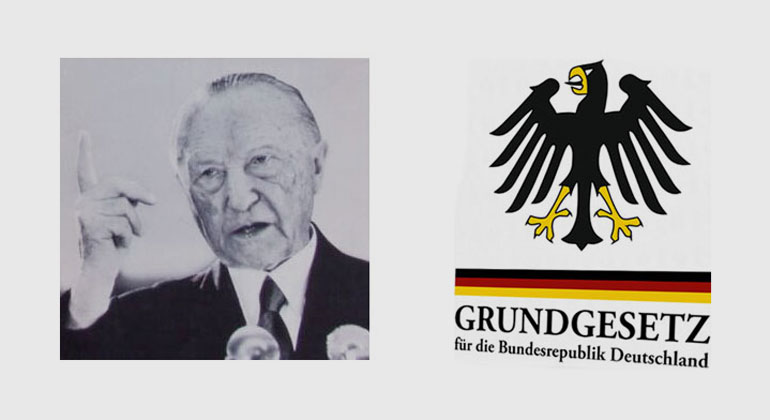It began with Adenauer
It was the zero hour after 1945, when Nazi Germany was defeated. 75 years ago, on August 10, 1948, a great moment in the history of German democracy began at Chiemsee in Bavaria.
The Constitutional Convention convened by the three Western occupying powers, the United States, England and France, met and within just 14 days produced the draft for the Basic Law of the Federal Republic of Germany, which is still famous today. At that time, 61 men and four women, elected by the already existing West German state parliaments, deliberated. The German parties had been re-established surprisingly quickly after the capitulation – even before a German state existed, or rather two German states from 1949.
Human rights and separation of powers were the main topics in Herrenchiemsee
Whether the state violates basic rights was to be decided by a Federal Constitutional Court. The chairman of the Parliamentary Council, which shortly thereafter finally decided on the Basic Law, was Konrad Adenauer. The history of the Federal Republic began with the then 72-year-old from Rhöndorf. The current celebration in Herrenchiemsee provided the setting for President Steinmeier to deliver a keynote speech that was simply due in light of the rising poll numbers for the AfD, which is in part hostile to the constitution.
“No freedom for the enemies of freedom!” was the tenor of this perhaps most important speech of Steinmeier’s term in office to date. The Federal President paid tribute to the most precious asset of Germany’s second democracy: the Basic Law with its famous Article 1: “Human dignity is inviolable.” This refers to human life from beginning to end.
This new democracy should never again be allowed to be misused for such monstrous crimes as those of the Hitler regime. Everyone was aware of the dangers to democracy 75 years ago. Whether that is still the case today? Josef Göbbels had said with unabashed candor: “It will always remain one of the best jokes of democracy that it provided its mortal enemies with the very means by which it was destroyed.”
Today, the nationalist AfD is stronger than ever and more radical on the right than ever. It is anti-Semitic, anti-Muslim, against the EU, fundamentally against foreign fellow citizens, and it denies the climate catastrophe. AfD politics are very similar to Trump politics. Is that really what we want?
Steinmeier: “Put despisers of democracy in their place”.
It is therefore worth quoting the German President’s speech further: “A democracy must be defensible against its enemies. Never again should democratic rights of freedom be abused in order to abolish freedom and democracy…We have a common responsibility for our democracy. We must protect it.” No voter, the German president said, could “plead extenuating circumstances when he visibly strengthens political forces that contribute to the brutalization of our society and the erosion of liberal democracy.”
Steinmeier also recalled the first sentence of the Chiemsee draft: “The state exists for the sake of man, not man for the sake of the state.”
On the same occasion, Bavarian State Parliament President Ilse Aigner admonished the AfD: “Wehret den Anfängen.” Bavaria’s Minister President Söder also recalled the “incredible achievement” of the Constitutional Convention, saying that 75 years ago in Herrenchiemsee Castle there were only “two telephones and no cell phones yet” to distract people. That had been a great advantage.
Also noteworthy: Climate activists of the “last generation” accused the German government on the sidelines of these celebrations at Herrenchiemsee of breaking the same constitution that was being celebrated here, because its policies leave the population defenselessly exposed to the climate catastrophe.
75 years after the Constitutional Convention, the bipartisan warnings about today’s enemies of the Constitution are more relevant than ever in postwar history. Voters will decide whether our democracy is capable of suicide or will survive. Have we learned from the past?
The Herrenchiemsee Conference marked the first democratic attempt of the young Federal Republic. Only 13 months later, on September 15, 1949, Konrad Adenauer was elected the first Chancellor of the Federal Republic – with a majority of one vote, his own.
He acknowledged the closest possible election outcome with the legendary phrase: “Et hät noch jut jejangen.” It is up to us whether this optimistic statement will still be true tomorrow.
Source
Franz Alt 2023 | Translated with www.DeepL.com/Translator (free version)








